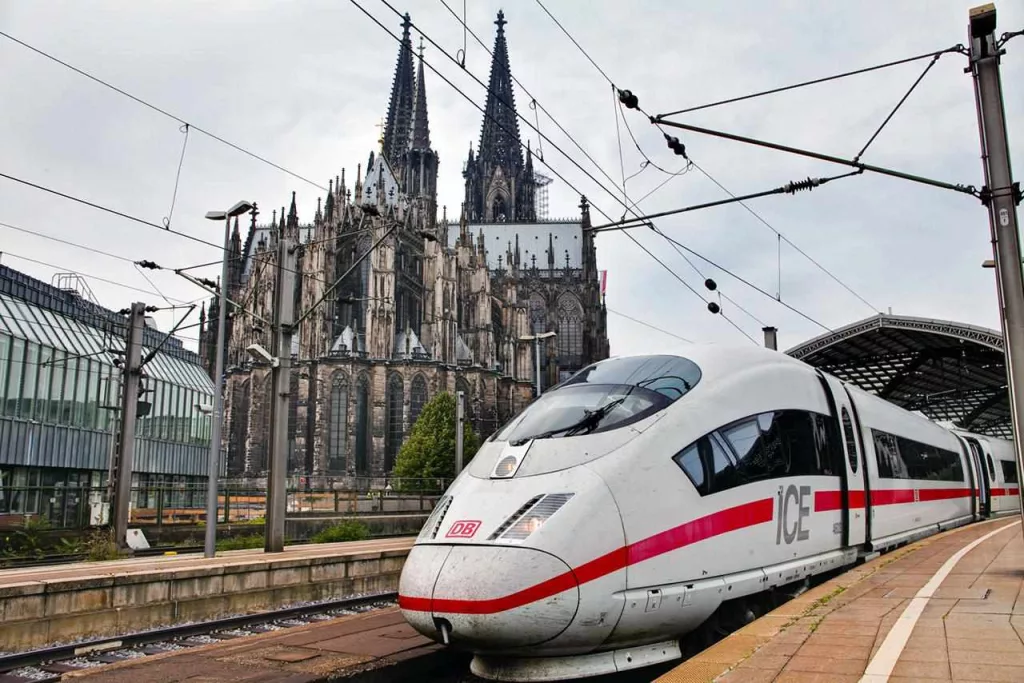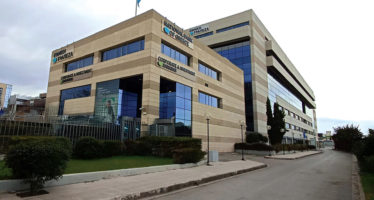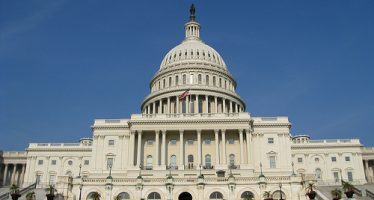Behind Schedule and Running Out of Ideas: Germany is On-Track for a Homegrown Infrastructure Crisis
A once-immaculate transport system is now underfunded and overstretched, reports Wim Romeijn.
The trains in Germany no longer run on time. This is a big issue for a country that derives its national identity from punctuality, order, and Gründlichkeit — thoroughness, usually ruthlessly applied.
The neighbouring Swiss now refuse to grant late-running German trains access to their network for fear of upsetting passengers, who expect clockwork precision.
Underfunded and overstretched, the fate of Deutsche Bahn (DB) epitomises the decay of Germany’s infrastructure and the loss of trust in the state’s ability to manage national affairs. Polls show 69 percent of Germans think the government lacks the ability to properly run their country.

DB needs about €45bn to update and upgrade the 33,200km rail network. In May, the federal parliament, or Bundestag, agreed to redirect some proceeds from HGV road tolls to modernisation. But that’s only half the amount needed.
Foreign affairs minister Annalena Baerbock met the downside of frugality in mid-August. The government plane she was travelling in left her stranded in Abu Dhabi during a refuelling stop. Shortly after take-off, the Airbus’s wing flaps malfunctioned, forcing the pilot to dump 80 tons of fuel over the Persian Gulf before returning to Abu Dhabi.
Baerbock had to cancel her official visit to Australia, New Zealand, and Fiji — and return home on a commercial flight.
A Lemon
The same aircraft — the Airbus 340-300, a lemon of 1990s vintage — had to make an emergency landing during a flight to Buenos Aires in 2018, where Chancellor Angela Merkel was to attend a G20 summit. The plane’s avionics suddenly quit. Two years before, it left then-defence minister Ursula von der Leyen stuck in Mali after a computer glitch.
The German government has now decommissioned the trouble-prone aircraft, and ordered three Airbus A350-900s in an overhaul of the Luftwaffe’s “White Fleet”.
Such anecdotal incidents point to years of neglect. In 2009, the Bundestag curtailed federal overspending by imposing a hard ceiling for budget deficits and national debt. The Schuldenbremse (debt brake) limits the debt-to-GDP ratio to 60 percent, and the budget deficit to a maximum of 0.35 percent. The twin locks ensured fiscal stability and sustainability, but forced the government to rein-in the infrastructure spend.
Since 2006, Germany has tumbled from third place in the WEF’s Global Competitiveness Report to 11th for the overall quality of its transport infrastructure. A bridge over the Rhine connects Leverkusen — founded in 1930 by chemical giant Bayer to house its workers, and now a city of 160,000 — to Cologne. Since 2012, the 1,061-metre Rheinbrücke Leverkusen has been closed to trucks after large cracks appeared in its support structure.
A Bridge Too Old
Emergency work failed to fix the cable-stayed bridge, which opened in 1965. A 10-lane replacement under construction is due to open next year. Until then, the crawl towards the congested bridges upstream remains a daily ritual for thousands of truckdrivers.
A national inspection report released last year concluded that more than 4,000 autobahn bridges need replacement before 2030. Of those, 1,001 have deteriorated to the point that weight and speed restrictions have had to be imposed. The €1bn earmarked by the federal government for annual bridge maintenance and replacement is nowhere near enough.
Infrastructure spending also runs foul of NIMBY (not-in-my-backyard) attitudes, and leads to time-consuming consultations with stakeholders. Even the IMF urged Germany to remove administrative and regulatory constraints.
Germany’s much-touted Energiewende — the shift to renewable energy — is also suffering. Autobahn GmbH, the state-owned highway management company, struggles with a backlog of over 20,000 applications for oversized cargo transports. According to the German Wind Energy Association, BWE, 150 permits are needed to move turbine parts such as rotor blades and tower elements by road. From planning to inauguration, the construction of a wind farm takes about 10 years. The pace must triple if the country is to meet its own energy goal of 80 percent derived from renewables by 2030.
Venting his frustration in an open letter, BWE chief Wolfram Axthelm likened German bureaucrats to the inhabitants of The Place That Sends You Mad, featured in the cartoon film The Twelve Tasks of Asterix.
The insistence of Germany’s burghers on fiscal prudence, and their aversion to grand infrastructure projects, grew stronger in the wake of the Brandenburg Airport debacle. Designed to replace the three smaller airports of Schönefeld, Tempelhof, and Tegel, Flughafen Berlin Brandenburg was delivered 14 years late — and four times over budget. Including the planning phase, it took almost 30 years to complete.
Sputtering Model
Germany is forecast to be the only G7 member with a shrinking economy this year. Its export-led model suffers from exposure to China, where a crisis is brewing. German industry, meanwhile, is battling high energy prices after its access to cheap Siberian gas was cut.
But the government has ruled out additional subsidies, including a flat rate of €0.06/kWh for industrial users proposed by Economy Minister Robert Habeck in a bid to maintain competitiveness. The spot market price for net-day electricity currently hovers around €0.09/kWh. Habeck’s plan carried an expected cost of about €30bn. Instead, the cabinet of Chancellor Scholz approved a €7bn corporate tax relief package.
Scholz presides over a fractious three-party coalition of social-democrats, Greens, and liberals. Ideological divisions have largely paralysed his government. The country needed almost a year to decide to support Ukraine (apart from the now-famous 5,000 helmets initially dispatched). Since then, to be fair, German support has been unwavering, with €5.5bn in annual military aid pledged to 2027. An estimated €30bn has been disbursed in military, economic, and humanitarian support.
In a sanguine mood, the Bundestag agreed to lift the debt brake for extra defence outlays. Scholz promised to free up €100bn to re-equip the Bundeswehr — so starved of funds that its soldiers were sometimes issued broomsticks instead of rifles for training.
All Cash, No Carry
The problem is not a shortage of cash, but a governance model that has become stuck. Lofty ambitions — such as the attainment a net-zero society by 2045 — clash with geopolitical and demographic realities. Over the next decade, an estimated two million Baby Boomers will retire from the workforce. The average age of German blue-collar workers stands at 45; it’s 39 in the US.
Though recent changes have made immigration laws slightly more welcoming to non-EU workers, CEOs want more. Business confidence reached a new low in May, when machinery manufacturers reported a 20 percent year-on-year drop in orders. Higher energy costs and record wage rises are putting a squeeze on corporate profits, although a rebound in consumer spending may bring solace.
Even a spate of good news last month failed to boost German spirits. Factory orders defied expectations by increasing seven percent from May to June, the biggest monthly jump in three years. Economists dismissed the news as an anomaly caused by a momentary surge in orders at the Airbus factory in Hamburg.
A poll conducted by the Federation of German Industry (BDI) found that a third of its members were unhappy with the direction Germany has taken. According to ZEW Mannheim, an economic research institute, the country now ranks 18th of 21 industrialised nations for family-owned companies to do business. This is considered a direct threat to the Mittelstand (mid-sized) firms that have long formed the backbone of German industry.
SMEs are a crucial component of a decentralised banking system comprising small regional banks — mostly co-operatives and savings banks — that extend fixed-rate loans. They have been put on the back foot by the rise in interest rates, and are less well equipped for riskier undertakings such as financing start-ups.
Pulling-Up Sticks
Frustration with bureaucracy drove BASF, the world’s largest chemical producer, to China — where it is building a €10bn petrochemical complex. There have been a few victories; Tesla chose Berlin for its European mega-factory, set to become the largest in Germany. Chip manufacturers Intel and TSMC were lured by an estimated €15bn in subsidies and tax breaks.
Chancellor Scholz has the unenviable job of keeping his coalition partners happy while lifting a nation out of its gloom. The Greens demand priority for the environment, and insisted that the country mothball its three remaining nuclear power plants in the midst of an energy crisis. It did so last April. The liberal Free Democrats are worried about deindustrialisation, while Scholz’s Social Democratic Party remains wed to fiscal rectitude.
The “German Speed” for business and economic matters promised by the coalition seems to have slowed to a crawl.
You may have an interest in also reading…
NBG Securities: Redefining Investment Services with a Vision for Growth
As a subsidiary of the National Bank of Greece, NBG Securities has evolved into a top-tier brokerage firm, leveraging its
European Investment Bank: A United Europe Can Emerge Stronger From the Pandemic
The most marked economic impact of the COVID-19 crisis is on small businesses, which find themselves with insufficient resources to
Otaviano Canuto, World Bank Group: Fiscal Policy Redux
As part of their response to negative shocks coming from advanced economies after the Lehman Brothers’ collapse in 2008, most
















































































